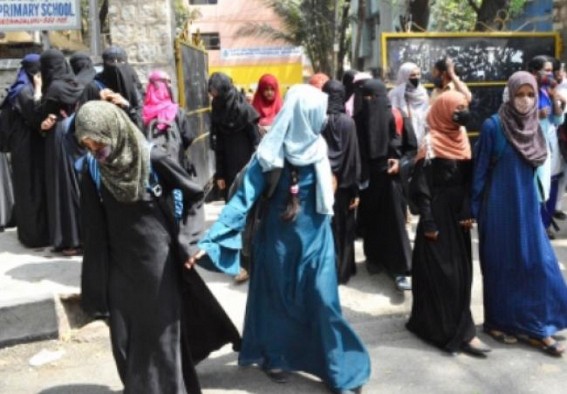TIWN

Bengaluru, Feb 21 (TIWN): According to the AG, only the essential religious practice gets protection under Article 25, which guarantees the citizens to practice the faith of their choice.
Hijab controversy: The Karnataka government on Monday reiterated that Hijab is not an essential religious practice and said religious instructions should be kept outside the educational institutions. "This is our stand that Hijab is not an essential religious practice. There was a statement by Dr B R Ambedkar in the Constituent Assembly where he said 'let us keep the religious instructions outside educational institutions'," Karnataka Advocate General Prabhuling Navadgi told the full bench of the High Court, which is hearing the Hijab case.
The full bench comprises Chief Justice Ritu Raj Awasthi, Justice J M Khazi and Justice Krishna M Dixit. According to the AG, only the essential religious practice gets protection under the Article 25, which guarantees the citizens to practice the faith of their choice. He also referred to "reforms in the religion" as part of the Article 25. As soon as the proceedings began, CJ Awasthi said certain clarifications were required related to Hijab.
"You have argued that government order is innocuous and the state government has not banned Hijab and not put any restrictions on it. The GO says that the students should wear the prescribed uniform. What is your stand -- whether Hijab can be permitted or not in the educational institutions?" the Chief Justice asked.
The AG quoted from the Sabarimala case, where the Court quoted the case of Durgah Committee, Ajmer v Syed Hussain Ali. The court had emphasized that purely secular matters clothed with a religious form do not enjoy protection as an essential part of religion.
Apart from engaging in a judicial inquiry to determine whether a practice claimed to be essential was in fact grounded in religious scriptures, beliefs, and tenets, the court said, it would 'carefully scrutinize' that the practice claiming constitutional protection does not claim superstition as its base.
- India feels the sting as Trump slaps $100,000 fee on H-1B visas
- Bihar Women’s Commission issues notice to Rahul Gandhi, Tejashwi Yadav over remarks on PM Modi’s mother
- ED raids 13 locations linked to AAP leader Saurabh Bharadwaj in hospital construction scam case
- CM Rekha Gupta, Union Minister Jitendra Singh receive astronaut Shubhanshu Shukla at Delhi airport
- IndiGo aircraft's tail touches runway at Mumbai Airport



